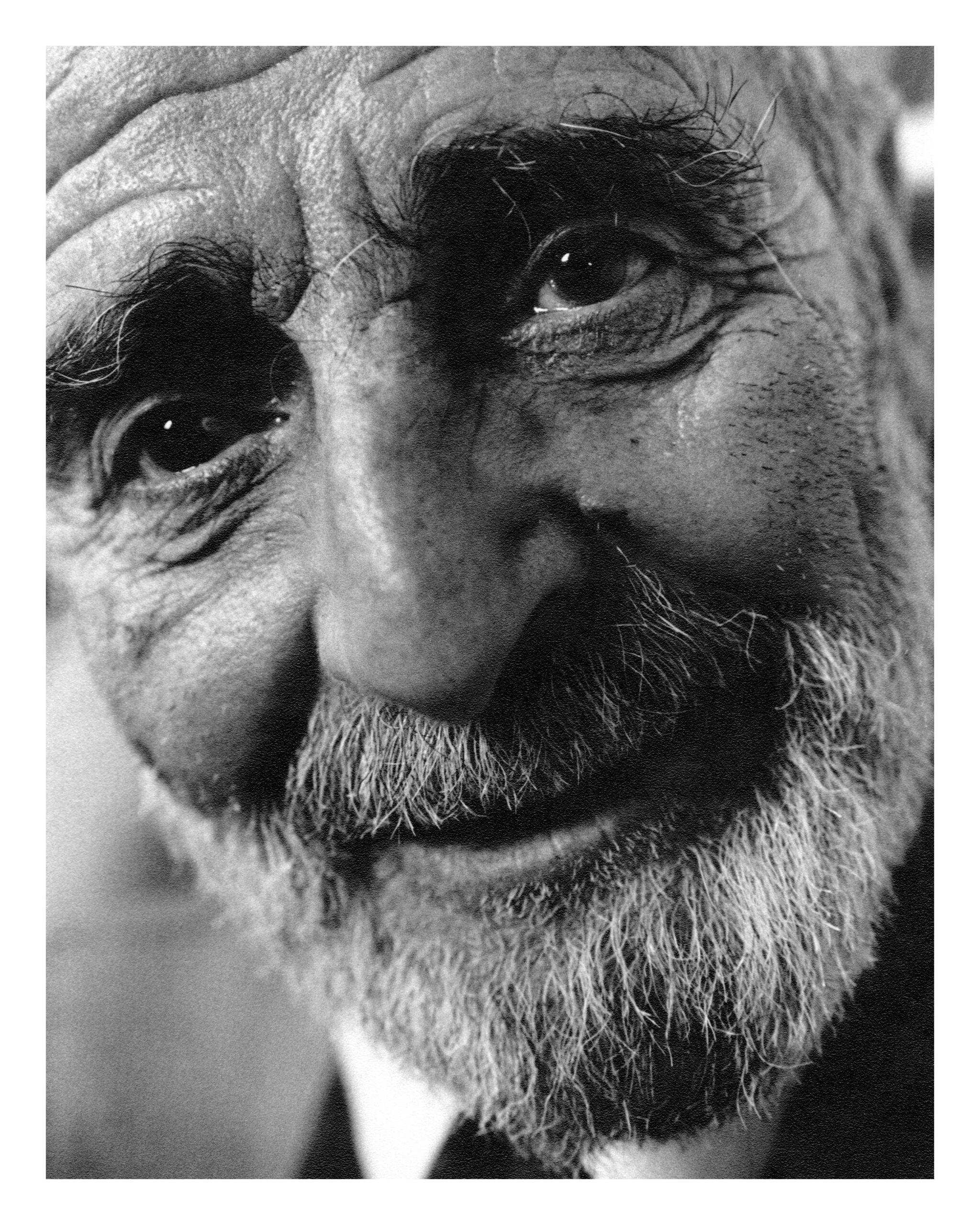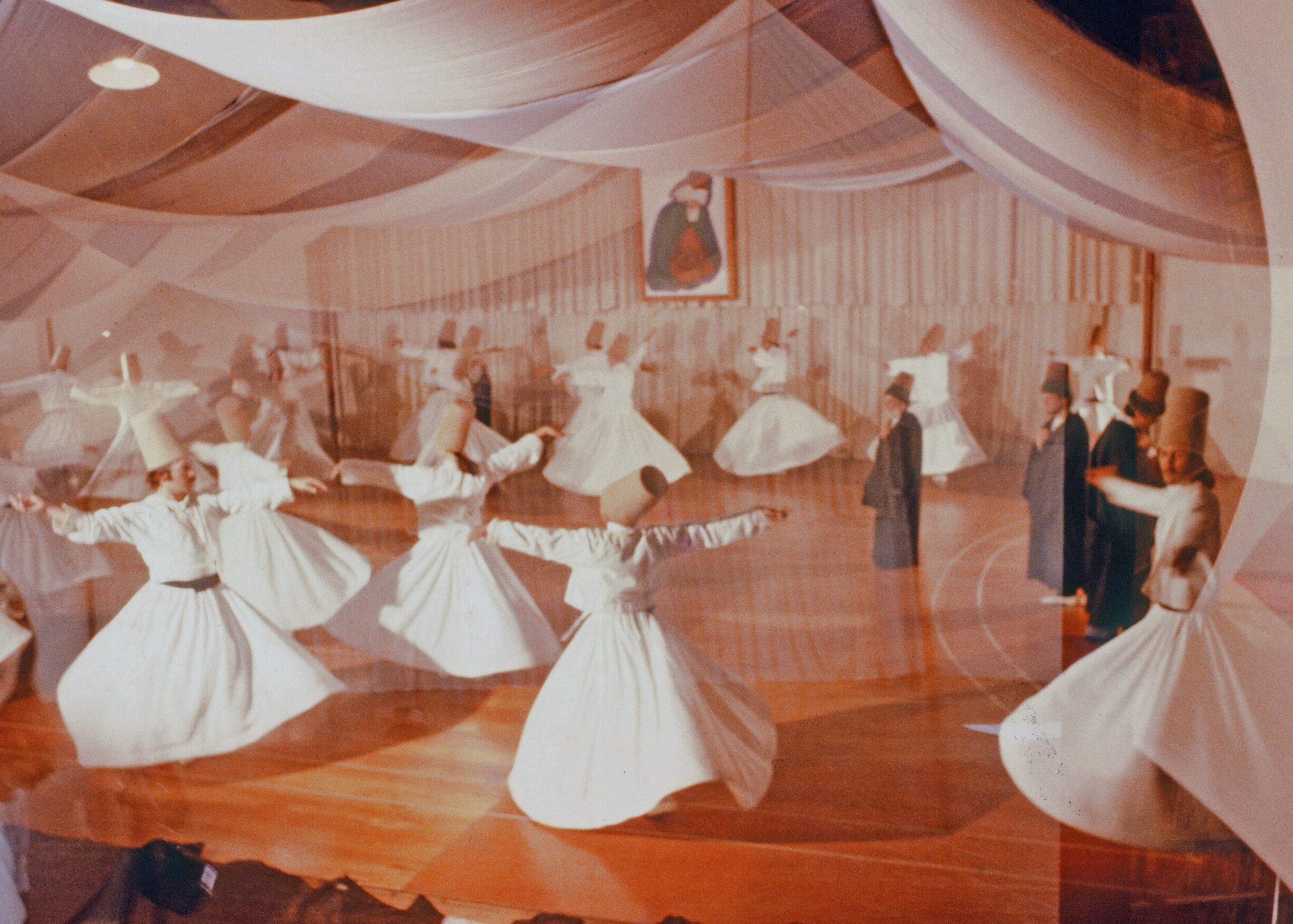Haji Murshid Suleyman Hayati Dede
The story of the Mevlevi Order of America is a story of wazifa. Wazifa is an assignment given by one’s teacher, a practice, a task, a role. We see these assignments as ultimately coming from the All Merciful One through the instrument of our teacher.

The founder of Mevlevi Order of America, and last Sheikh of Konya, Haji Murshid Suleyman Hayati Dede, entered into the monastery of the Mevlevi Order in Turkey when he was sixteen (1920).
“When I was 16, I entered the monastery and worked in the kitchen. I worked in the kitchen for 23 years. Usually, one works in the kitchen and cooks and does the hard chores for three years before one is eligible to become a Dede. However, that doesn’t mean that after three years you become a Dede. At that point, your superiors judge whether you’re worthy of ever becoming a Dede. I had no idea that I would become one, I just enjoyed being there. After 23 years, they gave me the title of Dede, and I received a meditation cell and didn’t work in the kitchen anymore.”
In 1925, as part of the creation of Turkey as a modern nation, through Law 677 Kemal Ataturk closed the tekke’s (Sufi schools) and made acting in any of the traditional roles of leadership in the Sufi Orders,and the wearing of traditional garb associated with Sufi practice illegal.
Between 1926 and 1949, Dede worked in a kitchen outside of the walls of the tekke, cooking food for the needy and despite Law 677, was finally given the title of Dede, one of the highest initiations in the Order. With this title, Dede began teaching the way of Mevlana. In these early years, according to Sheikh Daud Bellak, Dede’s teacher was a man named Sidke Dede who passed in 1933.
When the thirty-first hereditary leader of the Tariqa Mehmet Bakir Celebi died in 1944, his son and rightful heir, Celaluddin was just eighteen years old and studying in Syria to become an engineer. The young Celaluddin wasn’t able to assume his position as leader of the Order, so Suleyman Dede took on the traditional Konya role. Dede was given responsibility, as the “Sheikh of Konya” to welcome visitors and hold Rumi’s sacred presence in Konya.
Dede’ son and successor Jelaleddin remembered several visits to their home when he was around 6 (around 1956), from a man who was known as “Qtub.” Jelaleddin remembers him as having a “very Noor” (bright) face. Jelaleddin Dede said this man came to central Anatolia to find the Sufi people and organize them, putting the pieces of Sufism together “under the table.” He said, “It is time to be active again, a little out of hiding.” This man was known to be responsible for organizing the mystical practices, the Tasawuf of Islam. He gave Dede the wazifa to be responsible for the Mevlevi in Konya. At the time, Dede would hold zikhr in their house with curtains drawn. It was Jelaleddin’s job to watch out for the police and throw stones at the windows as a warning if the police appeared.
This man was known to be responsible for organizing the mystical practices, the Tasawuf of Islam. He gave Dede the wazifa to be responsible for the Mevlevi in Konya. At the time, Dede would hold zikr in their house with curtains drawn. It was Jelaleddin’s job to watch out for the police and throw stones at the windows as a warning if the police appeared.
Suleyman Dede continued to teach, together with other initiated sheikhs, young men (and later women) the Sema and other Mevlevi teachings in spite of the ban. In the mid-1950s, partly as a result of political changes in Turkey, the Mevlevis were allowed to perform the Sema in public in Konya at Shebi Arus, the commemoration of the death of Rumi celebrated on December 17. Dede explained why we Turn:
“If you are quiet and in a state of prayer when you Turn, offering everything of yourself to God, then, when your body is spinning, there is a completely still point in the center … The heavens respond. and all the invisible kingdoms join in the dance. We turn around in the way we do so that the Light of God may descend upon the earth. ‘As you act as the conduit in the Turn. the light comes through the right hand. and the left hand brings it into this world … We turn for God and for the World. and it is the most beautiful thing you can Imagine”

In 1973 the Turkish government gave the Mevlevis permission to tour in England, France, and North America to celebrate the 700th anniversary of Rumi’s birth. This has been considered the starting point for Suleyman Dede’s wazifa to spread the teachings of Rumi in Euro-America.
Ultimately, seeing the need and the possibility of transplanting the Mevlevi Tradition to the West, Dede traveled to America in the late 1970’s visiting New York, West Virginia, Colorado, Vancouver, Canada and as far as Hawai’i. Hazreti Pir Mevlana Jelaluddin Rumi is reported to have said:
“I am the Sun. I will rise in the West. And I will become a household word.”
Summarizing his wazifa, Dede said: “I come to plant Mevlana’s message of universal love in this soil. The way of Mevlana, of Rumi, will grow in the West in its own way.”

Suleyman Dede leading the Sema ceremony in West Virginia in 1979
Suleyman Hayati Dede passed into the presence of the Beloved in 1985. May Allah be pleased with him.
Come to the Circle of Mevlana
And see the joy that is there
See that there, is the remedy
To a thousand kinds of dark sufferings.
You won’t find there,
The tale of slander and hypocrisy,
But there, will be the sound of drum, ney and kanun.
If you are a seeker,
Fall down on the ground in prostration.
That you may see
What kind of mood there is?
In His Pure Grace.
There they will give you incense
And in its fragrance
You will smell the scent of the Archangel
And the secrets of the Giver.
They will give a cup to you
And in the color of it,
You will perceive the light of the Rose.
Drink from the cup of that gathering
And fall into ecstasy,
And within it find that “Joy of Eternity”
The one who sacrificed his head
For the Grace, like you HAYATI.
There are thousands of lovers
But only one Beloved
Suleyman Hayati Dede, translated by Sheikh Murat Yagan
